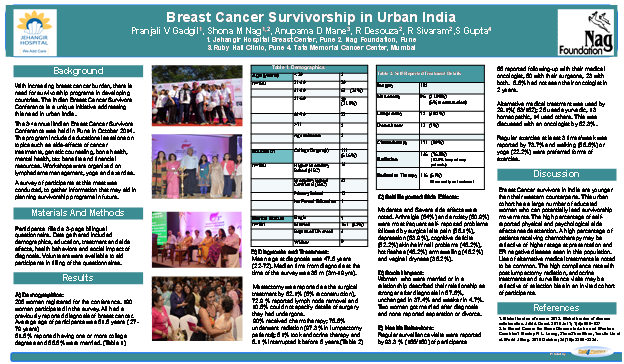Background: The Annual Indian Breast Cancer Survivors’ conference addresses the lacunae that exists between survivorship and patients. It is a mix of technical and practical sessions and activities that focus on helping patients and caregiver cope with issues that arise after completion of treatment.The year 2019 saw the 8th edition of the conference held in Pune, Maharashtra, India.
A survey filled at registration would help us understand the short and long term side effects of treatments as well as the emotional and psycho-social changes that can happen during and post treatment. This would help in designing survivorship programs to address specifically the needs of patients and survivors.
Methodology: 245 survivors and patients attended the conference representing both urban and semi-urban from western Maharashtra. 125 survey questionnaires were analyzed, these were with complete details.
The survey was divided into three sections, the first section had demographic details, the second half pertained more to the side effects and the remaining section was the DASS (depression, anxiety and stress scale). The DASS scale is designed to measure the emotional states of depression, anxiety and stress
The section with details of short term and long term side effects was finalized after detailed discussions with surgical, medical and radiation oncologists.
The depression scale assesses general outlook towards life, feelings of hopelessness, devaluation of life, undervaluation of self, lack of interest etc. The anxiety scale assesses the physical impacts of anxiety. The stress scale assesses difficulty in relaxing, nervousness, being easily upset or agitated, irritable or over-reactive and impatient.
Findings: The mean age of the respondents was 44.2 years and 48% of the participants were disease free for 1 to 5 years while 21% were disease free for 6 to 10 years.
In terms of co-morbid disease, 80% of the respondents were dealing with some form of diseases. Thyroid (hyper or hypo) lead the way with 18.4%.
79% had undergone Chemotherapy and Radiation, while 38.4% had Breast Conservative Surgery.
Sideeffects, both long and short were evaluated. Loss of hair was more accentuated even though participants were finished with treatment and had their hair grown back.

When you look at the general physical and psychological impact of cancer, loss of hair seems to be most long lasting and impacting.
Sexuality is ignored and through discussions and interviews with patients, it is addressed superficially by their oncologists. There is shyness when it comes to talking and discussing sexuality and intimacy with their treating doctors and even during follow up.
In terms of measuring psycho-social impact, it was decided to administer the DASS. This was used only as to get an understanding on the mental framework of the patient and survivors. The DASS was not used as a diagnostic tool.
Anxiety topped the chart with 21.6 % of participants responding to severe to extremely severe response. Depression followed slowly with 6.4 % respondent. Stress as an emotional impact, only 3.2 participants responded.
Further interviews with the participants helped understand that anxiety was related to health, family (specifically marriage of children) and fear of recurrence.
If we need to improve quality of life we need to focus on all aspects of survivorship in our follow up care plan.
I. SEXUALITY IN BREAST CANCER SURVIVORS – A QUALITATIVE STUDY
II. FROM HELPLESSNESS TO SELF HELP
Abstract submitted and accepted at the ASCO Survivorship conference San Diego 2016 – 17
In The Indian Scenario, a diagnosis of cancer is accompanied with social stigma and emotional upheavals especially in Breast Cancer patients. They are typically thinking of
All these concerns are not always addressed by the medical professions. To address these issues the Indian Breast Cancer Survivors Conference was organized.
A conference that would address the needs of breast cancer survivors and give them a platform where their doubts, fears, problems both physical and psychological could be addressed, as also an opportunity to connect with other survivors.
The conference addressed the psychological, emotional and social distress experienced by the patients with an aim from living a longer life to living a better and fulfilled life.
Emphasis of the sessions were
Sessions are moderated either by an oncologist or a psychologist or a survivor counselor and use different techniques to work with various emotional and social issues faced by our patients. Techniques include expressive, creative art therapy, venting out through guided discussions, etc.
The conference motivates survivors and patients to move from being a patient beneficiary to being a patient advocate. Patient advocates are involved in connecting with other patients, creating an awareness about cancer, empowering patients and caregivers to seek medical advice, bridging the psychological disconnect that exists between patient and doctors as well as disease and society.
In conclusion the change we can evaluate through post conference support group discussions and conference feedback, qualify patient psychological and social health as:
Physical: There are side effects but I Choose to go on
Emotional: Little things upset me, angry quickly but I am dealing with it
Spiritual: Moved away from bargaining with God to accepting , from rituals to spiritual.
Social: don’t hesitate to reach out for support and to support
Intellectual: Knowledge is power, so I have learnt to ask, to question and then to decide
Achieving psychological and social health is the effort of the patient, the treating team and the support group.

The Surabhi Nag Research Award is given out each year to Indian researchers for submitting original research in any field of cancer prevalent in India,thus encouraging better understanding.